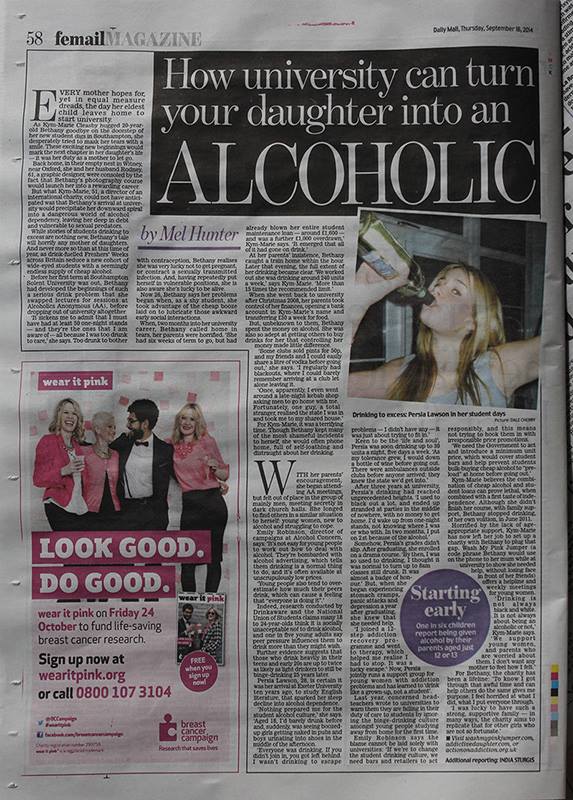|
Source
Every mother hopes for, yet in equal measure dreads, the day her eldest child leaves home to start university. As Kym-Marie Cleasby hugged 20-year-old Bethany goodbye on the doorstep of her new student digs in Southampton, she desperately tried to mask her tears with a smile. These exciting new beginnings would mark the next chapter in her daughter’s life — it was her duty as a mother to let go. Back home, in their empty nest in Witney, near Oxford, she and her husband Rodney, 61, a graphic designer, were consoled by the fact that Bethany’s photography course would launch her into a rewarding career. But what Kym-Marie, 51, a director of an international charity, could not have anticipated was that Bethany’s arrival at university would precipitate her downward spiral into a dangerous world of alcohol dependency, leaving her deep in debt and vulnerable to sexual predators. While stories of students drinking to excess are nothing new, Bethany’s tale will horrify any mother of daughters. And never more so than at this time of year, as drink-fuelled Freshers’ Weeks across Britain seduce a new cohort of wide-eyed students with a seemingly endless supply of cheap alcohol. before her first term at Southampton Solent University was out, Bethany had developed the beginnings of such a serious drink problem that she swapped lectures for sessions at Alcoholics Anonymous (AA), before dropping out of university altogether. ‘It sickens me to admit that I must have had at least 50 one-night stands — and they’re the ones that I am aware of — all because I was too drunk to care,’ she says. Too drunk to bother with contraception, Bethany realises she was very lucky not to get pregnant, or contract a sexually transmitted infection. And, having repeatedly put herself in vulnerable positions, she is also aware she’s lucky to be alive. Now 26, Bethany says her problems began when, as a shy student, she took advantage of the cheap booze laid on to lubricate those awkward early social interactions. When, two months into her university career, Bethany called home in tears, her parents were horrified. ‘She had six weeks of term to go, but had already blown her entire student maintenance loan — around £1,600 — and was a further £1,000 overdrawn,’ Kym-Marie says. ‘it emerged that all of it had gone on drink.’ At her parents’ insistence, Bethany caught a train home within the hour. later that evening, the full extent of her drinking became clear. ‘We worked out she was drinking around 240 units a week,’ says Kym-Marie. ‘more than 15 times the recommended limit.’ When she went back to university after Christmas 2008, her parents took control of her finances, opening a bank account in Kym-Marie’s name and transferring £30 a week for food. But, unbeknown to them, Bethany spent the money on alcohol. She was also so adept at getting others to buy drinks for her that controlling her money made little difference. ‘Some clubs sold pints for 50p, and my friends and I could easily share a litre of vodka before going out,’ she says. ‘I regularly had blackouts, where I could barely remember arriving at a club let alone leaving it. ‘Once, apparently, I even went around a late-night kebab shop asking men to go home with me. Fortunately, one guy, a total stranger, realised the state I was in and took me to my shared house.’ For Kym-Marie, it was a terrifying time. Though Bethany kept many of the most shameful incidents to herself, she would often phone home, full of self-loathing and distraught about her drinking. With her parents’ encouragement, she began attending AA meetings, but felt out of place in the group of mainly men, meeting secretly in dark church halls. She longed to find others in a similar situation to herself: young women, new to alcohol and struggling to cope. Emily Robinson, director of campaigns at Alcohol Concern, says: ‘It’s not easy for young people to work out how to deal with alcohol. They’re bombarded with alcohol advertising, which tells them drinking is a normal thing to do, and it’s often available at unscrupulously low prices. ‘Young people also tend to overestimate how much their peers drink, which can cause a feeling that “everyone is doing it”.’ Indeed, research conducted by Drinkaware and the National Union of Students claims many 18 to 24-year-olds think it is socially unacceptable not to drink alcohol, and one in five young adults say peer pressure influences them to drink more than they might wish. Further evidence suggests that those who drink heavily in their teens and early 20s are up to twice as likely as light drinkers to still be binge-drinking 25 years later. Persia Lawson, 28, is certain it was her arrival at Exeter University ten years ago, to study English literature, that sparked her lack of boundaries around alcohol. ‘Nothing prepared me for the student alcohol culture,’ she says. ‘Aged 18, I’d barely drunk before and, suddenly, was seeing boozed-up girls getting naked in pubs and boys urinating into shoes in the middle of the afternoon. ‘Everyone was drinking. If you didn’t join in, you got left behind. I wasn’t drinking to escape problems — I didn’t have any — it was just about trying to fit in.’ Keen to be the ‘life and soul’, Persia was soon drinking up to 10 units a night, four days a week. ‘As my tolerance grew, I would down a bottle of wine before going out. There were ambulances outside clubs before anyone arrived: they knew the state we’d get into.’ After three years at university, Persia’s drinking was getting progressively worse. ‘I used to black out a lot, and ended up stranded at parties in the middle of nowhere, with no money to get home. I’d wake up from one-night stands, not knowing where I was or who with. In two months, I put on 2 st because of the alcohol.’ Somehow, Persia’s grades didn’t slip. After graduating, she enrolled on a drama course. ‘By then, I was so used to drinking, I thought it was normal to turn up to 8am classes still drunk. It was almost a badge of honour.’ But, when she began experiencing stomach cramps, panic attacks and depression a year after graduating, she knew that she needed help. ‘I joined a 12-step addiction recovery programme and went to therapy and started looking at the reasons I was drinking so much in the first place - because I didn't value and respect myself. 'I started to drink less, do exercise and eat more healthily, which meant that I no longer needed to turn to booze to escape from my problems and lack of self-worth.' Now, Persia jointly runs a support group for young women called Addictive Daughter. It's aimed at young women who struggle with addictive behaviours, inspiring them to make healthier lifestyle choices. She has now learned to ‘drink like a grown-up, not a student', and is much happier as a result. Last year, concerned headteachers wrote to universities to warn them they are failing in their duty of care to students by ignoring the binge-drinking culture amongst young people studying away from home for the first time. Emily Robinson says the blame cannot be laid solely with universities: ‘If we’re to change the student drinking culture, we need bars and retailers to act responsibly, and this means not trying to hook them in with irresponsible price promotions. ‘We need the Government to act and introduce a minimum unit price, which would cover student bars and help prevent students bulk-buying cheap alcohol to “pre-load” at home before going out.’ Kym-Marie believes the combination of cheap alcohol and student loans can prove lethal, when combined with a first taste of independence. Although she didn’t finish her course, with family support, Bethany stopped drinking, of her own volition, in June 2011. Horrified by the lack of age-appropriate support, Kym-Marie has now left her job to set up a charity with Bethany to plug that gap. Wash My Pink Jumper (a code phrase Bethany would use on the phone to her mum while at university to show she needed help, without losing face in front of her friends) offers a helpline and weekly meetings for young women. ‘Drinking is not always black and white. It is not always about being an alcoholic or not,’ Kym-Marie says. ‘We support young women, and parents who are worried about them. I don’t want any mother to feel how I felt.’ For Bethany, the charity has been a lifeline: ‘To know I got through that awful time and can help others do the same gives me purpose. I feel horrified at what I did, what I put everyone through. ‘I was lucky to have such a strong, supportive family — in many ways, the charity aims to replicate that for other girls who are not so fortunate.’ Visit washmypinkjumper.com, addictivedaughter.com, or actiononaddiction.org.uk Comments are closed.
|
|
|
ROC Angels - an initiative of ROC (Redeeming Our Communities)
Charity - 1139817 / Registered Company - 7327258 Postal Address: ROC Angels, c/o The King's Centre, Park Rd, Halifax, HX1 2TS E-Mail: [email protected] (founder / CEO) / Phone: 07725501465 |


 RSS Feed
RSS Feed